In the wonderful state of Georgia, there are a few hundred different species of weeds. Not all species of weeds are terrible or invasive. However, if you don’t get weeds under control as soon as possible, they can become a nightmare. Many of the weeds species you find in Georgia have pretty flowers and don’t look like they could possibly be weeds but they are. Annual bluegrass, crabgrass, yellow nutsedge, common Bermuda grass, and clover are usually the hardest to control, yet the most prevalent around Metro Atlanta.
Attaining a beautiful, lush, and weed-free lawn is quite a daunting task, especially if you are doing it yourself. While some broadleaf weeds are simple to identify and require little effort for treatment, this article delves more into the most common weeds that have taken up residence and are currently residing in your lawn without your knowledge or permission. Whether you have thick and hearty St. Augustine, shade loving Zoysia, or warmth-thriving Bermuda, it’s good to know how to identify and treat the weeds that are lurking around your beautiful grass.
Crabgrass
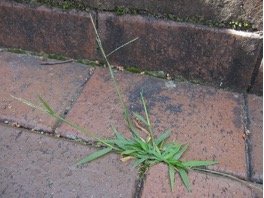
This is crabgrass. Maybe it looks familiar? It’s been the nemesis of many a homeowner and is one of the biggest culprits around. It’s ugly and it even looks like it was meant to hurt someone. Crabgrass is easily one of the worst offenders in Georgia. What you should know about crabgrass is that it thrives in heat. So even in a drought, while your other plants and grass are struggling, crabgrass has never been more at home. When you see this nasty vermin rearing its ugly head in your yard, be sure to nip it in the bud. You must pull it up-roots, stem, and all. To keep this heat-loving grass away from your garden, mulching is a great idea. Applying pre-emergent can go a long way to help kill crabgrass before the seeds are even germinated.
Yellow Nutsedge
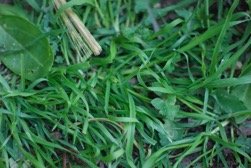
Though this one doesn’t look terribly aggressive, do not be fooled by its nonchalant looks. Yellow nutsedge can be a real pain to eradicate. The leaves are typically a little broad and pointy and almost look pretty. But it’s not pretty. It is, in fact, quite unattractive. One thing you must be aware of is that the seeds of nutsedge can blend in with your out of season Bermuda and with the thatch that may be built up. Again, a pre-emergent is ideal for this type of weed, as spot treating it can be time-consuming and can also have side effects that range from light brown spots to actually killing grass. The best weeds are dead weeds – this is a fact. However, don’t let your thirst for killing thine enemy overtake your good sense and kill your beloved grass in the process.
Bluegrass
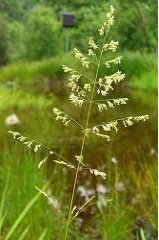
The harmless looking weed pictured here is of the Annual Bluegrass species. Despite its namesake, Bluegrass is anything but annual, it is quite perennial and can grow during all seasons. Some studies suggest that lower mowed turfs that get frequent watering and nitrogen-heavy fertilization are at much higher risk of promoting bluegrass’ growth. However, traditional Bermuda seems to be more able to withstand the invasive Bluegrass, though it’s not completely impervious to it. Pre-emergents typically have no problem keeping Annual Bluegrass at bay. As with all other weeds, proper preventative maintenance, and some good old elbow grease can help keep your lawn Bluegrass-free.
Bermuda
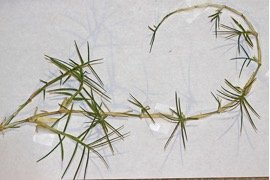
This is an example of Bermuda grass that’s been pulled up from its roots system. Bermuda can be a gorgeous breed of grass and is on thousands of golf courses throughout the entire world, but especially in the south, where golfing is so prevalent. The downfall of Bermuda grass is that there are still a few million people who prefer the look, feel, and always green color of Fescue. Bermuda grass making its way into your fescue yard is no hard feat. This invasive species isn’t considered a weed for no reason. It is very low-lying to the ground and can and will sneak underneath your Fescue if it’s left unchecked. Luckily, lawn services that treat your yard can seek out and eradicate this vicious, heat-thriven intruder. Though it may look nice in your neighbor’s yard, if you would rather have the softer, taller Fescue, be sure to ask your lawn care professional about treating for Bermuda grass infiltration.
Clovers
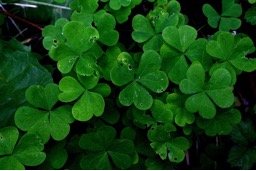
When you’re a kid, looking for, and occasionally finding, four-leaf clovers is pretty cool. As a grown up, however, finding clovers in any number is just a headache. Sure they’re cute when you’re young, but the older you get the more of a nuisance they are.
Clovers infest your yard in patches and take over where grass used to thrive. One specifically helpful tip is when pulling up or cutting clover, do not let it mix in with either your compost or your grass clippings. Due to the nature of clover, it can still spread, germinate and grow after it’s been cut.
Dandelions
Another weed we all tend to enjoy when we’re younger is the Dandelion. Remember making a wish and blowing the small cotton-like petals off of the flowers? That was great. But as grownups we’ve got a responsibility to keep our yards weed free. And Dandelions are weeds.Who had the audacity to give it a name that sounds like the word dandy? There is nothing dandy about these intrusive weeds, and they must be pulled from the taproot up to effectively be exterminated.
Fight the Weed Battle With the Ultimate Weapon…Grass
That’s right, grass. A lush, vigorous lawn is the ultimate weapon in the march to decimate weeds. The thicker and healthier your grass is, the less of a chance weeds have to germinate, get sun, and grow. The ultimate deterrent of weeds is a lack of sunlight. The grass must crowd out the weeds and take over what belongs to it (i.e. nitrogen-rich soil). Basically suffocating the weeds is more effective than any type of chemical treatment, mostly because the treatments don’t focus solely on the weeds, and can leave brown, or even bald spots on your lawn. The truth is, if you’re into doing it yourself, a weed-free lawn can be attained but it’s not going to be easy. It’s difficult because all lawns are different and there is not a be-all, end-all weed killer or herbicide that works for every type of grass in every climate.
If you’ve tried the well-beaten path of herbicide, pulling weeds, and fertilization, and you’d like to get a professional involved, give Perfectly Green Lawn Care a call.
